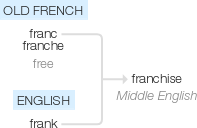Franchise
Middle English (denoting a grant of legal immunity): from Old French, based on franc, franche ‘free’ (see frank1). franchise (sense 2 of the noun) dates from the late 18th century and franchise (sense 1 of the noun) from the 20th century.
wiktionary
From Middle English franchise, fraunchise, from Old French franchise(“freedom”), a derivative of franc(“free”). More at frank.
From Middle English franchisen, fraunchisen, from Old French franchir(stem franchiss-, “to set free”), from franc(“free”). More at frank.
etymonline
franchise (n.)
c. 1300, fraunchise, "a special right or privilege (by grant of a sovereign or government);" also "national sovereignty; nobility of character, generosity; the king's authority; the collective rights claimed by a people or town or religious institution," also used of the state of Adam and Eve before the Fall, from Old French franchise "freedom, exemption; right, privilege" (12c.), from variant stem of franc "free" (see frank (adj.)).
From late 14c. as "freedom; not being in servitude; social status of a freeman;" early 15c. as "citizenship, membership in a community or town; membership in a craft or guild." The "special right" sense narrowed 18c. to "particular legal privilege," then "right to vote" (1790). From mid-15c. as "right to buy or sell," also "right to exclude others from buying or selling, a monopoly;" meaning "authorization by a company to sell its products or services" is from 1959.
franchise (v.)
late 14c., "to make free," from Old French franchiss-, past participle stem of franchir "to free" (12c.), from franc "free" (see frank (adj.)). Franchising is from 1570s; the commercial licensing sense is from 1966. Related: Franchisee; franchiser; franchisor.
